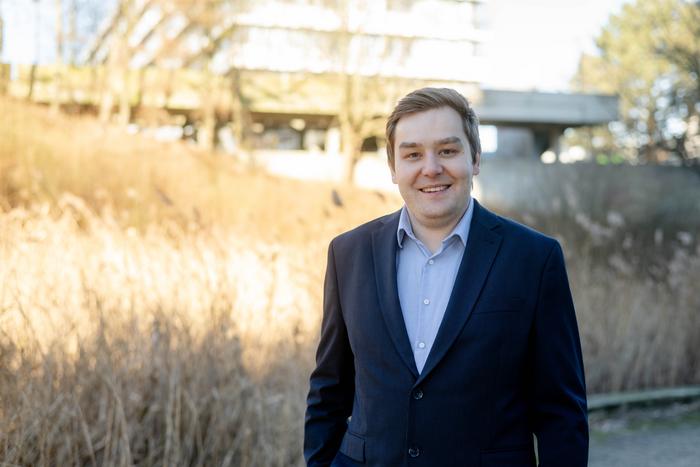Dreaded side effects

Credit: © RUB, Marquard
Dreaded side effects
Approximately half of all chemotherapy drugs used to treat cancer are platinum-based. They act against tumor cells, but they also do damage healthy body cells. This is what causes the dreaded side effects such as nausea, hair loss, liver and kidney damage.
Johannes Karges applies double selectivity in his research: The cell-damaging active substances are packaged in nanoparticles that are not harmful to the body. Moreover, they’re marked in such a way that they accumulate primarily in tumor cells. “They dock onto a specific receptor that is found to be overexpressed in cancer cells,” explains Karges. And they only develop their cell-damaging effect once they’ve been activated. The researchers use light for this purpose. “Ideally, it will no longer be necessary to perform surgery to treat a tumor,” as Johannes Karges outlines his vision. “We’ll administer the drug into the patient’s vein, wait until it has accumulated in the tumor and then position the patient under a red light lamp that specifically activates the compound and triggers the therapeutic effect.” The researchers successfully demonstrated this therapeutic concept in breast cancer cells and in mouse models with a breast cancer tumor. Thanks to the double selectivity of the newly developed active substances, none of the typical side effects were observed in the animal model. The breast cancer tumor, however, was selectively removed in a single treatment.
About the person
Johannes Karges (born in 1992) studied chemistry at the Philipps University Marburg. After completing his bachelor’s degree, he pursued postgraduate studies at Imperial College London on an Erasmus scholarship and obtained his master’s degree in Marburg in 2016. Karges then moved to Paris to write his doctoral thesis in medicinal inorganic chemistry under the supervision of Professor Gilles Gasser at the University of Paris Sciences & Lettres. He completed some of the research for this thesis in the laboratory of Professor Hui Chao at Sun Yat-Sen University (China).
In 2020, after successfully completing his doctorate, Karges joined the group of Professor Seth M. Cohen at the University of California San Diego. In 2022, he received a Liebig Fellowship from the Fonds der Chemischen Industrie, which enabled him to return to Germany and pursue a career as an independent researcher. He used this funding to set up his own research group at the Faculty of Chemistry and Biochemistry at Ruhr University. The group specializes in the interface between inorganic and medicinal chemistry.
Original publications
Huiling Zhou, Dongsheng Tang, Yingjie Yu, Lingpu Zhang, Bin Wang, Johannes Karges, Haihua Xiao: Theranostic Imaging and Multimodal Photodynamic Therapy and Immunotherapy using the mTOR Signaling Pathway, Nature Communications, 2023, DOI: 10.1038/s41467-023-40826-5
Dengshuai Wei, Yun Huang, Bin Wang, Lili Ma, Johannes Karges, Haihua Xiao: Photo-Reduction with NIR Light of Nucleus Targeting Pt(IV) Nanoparticles for Combined Tumor-Targeted Chemotherapy and Photodynamic Immunotherapy, Angewandte Chemie International Edition 2022, DOI: 10.1002/anie.202201486




